Rob Janicke's Blog: Generation Riff, page 2
March 4, 2024
Buy Concert Tickets or Don’t, but Understand We All Have a Hand in Their Skyrocketing Prices

Photo by Sasun Bughdaryan on Unsplash
Stop me if this sounds familiar…
“I remember the first time I saw (insert artist’s name here), the tickets were $20 and now they want $350? All they care about is money; I’ll never see them again.”
We’ve all heard this take before; we may have been saying it ourselves in some cases. It’s almost an automatic and understandable response, but it’s also lazy.
Everything in life is relative, so depending on your age, economic status, level of music fandom, and so many other factors, where you fall on the outrage meter of concert ticket prices will take all of that into account.
For transparency, my first concerts occurred in 1985 (Iron Maiden, Prince, and Duran Duran) when I was 12 years old. I don’t remember the ticket prices because it was 39 years ago, and I was 12. A quick Google search revealed that the ticket prices for the Iron Maiden show ranged from $12 to $20 for decent seats. Maiden was one of the biggest bands in the world at that time.
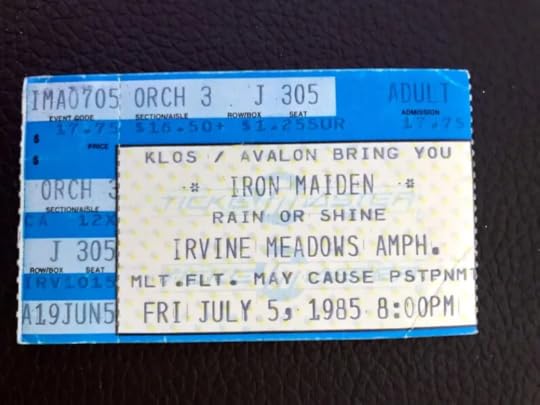
Photo credit Etsy
If you think one of the biggest pop stars ever would charge more at that time than a metal band, you’d be wrong. Check out this ticket stub from Prince’s Purple Rain Tour:
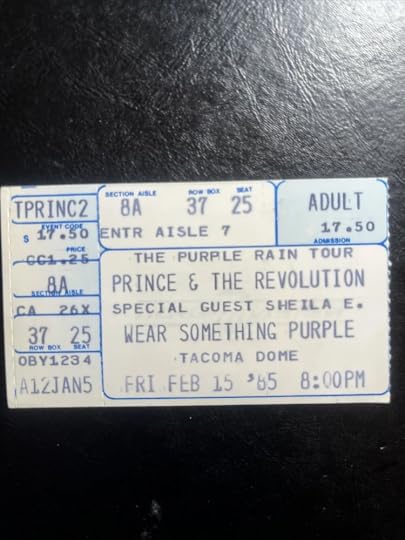
Photo Credit — Ebay
As I said, everything is relative, so my perspective on going to concerts and watching the entire music industry change covers many decades. Seeing these prices for such popular artists is astonishing for some, and that makes complete sense to me. Why did it all change so drastically?
Prince’s last tour, which started in 2015, offered ticket prices from $200 to $600 at face value. Prince played in smaller venues to try to keep as many tickets off the secondary market as possible, and the low inventory meant higher prices to fans. The idea was to fill the place with as many “real” fans as possible. Forbes has a good article about it all here.
The secondary ticket market, or scalpers as I grew up calling them, has long since been a reason for the cost of ticket prices to rise steadily. It’s not the only reason, however.
Like any other product, concert tickets are a commodity to be bought and sold. The United States operates under a capitalistic economic system. Supply and demand rule the day, and oftentimes, the “winners” in this system come down along the lines of the haves and have-nots. If you can afford something, you can have it, and if you can’t, someone is always coming up behind you who can.
In addition to the secondary market, inflation affects how much tickets cost. These two reasons are just part of the messy web of skyrocketing ticket costs.
Surging concert ticket prices have been happening for a few years now and seemingly, they’re only getting higher. This is a topic however that needs a view from 30,000 feet to see and understand all of the reasons why. We can yell and scream and dislike it all we want, but that won’t solve a thing. We need to know what caused this hefty surge and collectively figure out how to manage it.
You’ll find many articles citing mysterious and hard-to-understand ticket fees, dynamic pricing structures, the COVID-19 pandemic, fuel and transportation costs, and so on. These are all valid reasons and important pieces to the puzzle of why prices have become astronomically high.
One such article by Natalie Harmsen of CBC Music lays all of this out very accurately.
Something I’ve spoken about in prior articles and social media posts included all of the reasons already listed. Still, there’s one more aspect I discuss that I don’t see much of, and in my opinion, it’s one of the harshest realities facing artists and fans today.
When streaming services like Spotify and Apple Music became the new normal concerning how the world consumed music, musicians’ ability to earn a living selling albums essentially became obsolete. Artists have little choice but to pivot and make money in other ways since selling records is no longer viable. Touring has always been a lucrative but supplemental revenue stream for musicians. Now though, it’s the number one way for them to earn a living. Yes, there are additional ways like co-branding with corporations, making money using social media platforms, and if you’re big enough, selling parts or all of your publishing catalog.
See, I told you this topic needs a birds-eye view to even remotely figure it all out.
According to a report in Forbes, music streaming accounts for 84% of total music industry revenue. 2022 music streaming revenue reached approximately $17.5 billion (IFPI). In comparison, recorded music revenue (inflation-adjusted to 2022 figures) was nearly $26 billion in 1999, according to reports from the RIAA (Recording Industry Association of America).
I’ll get into physical music sales soon because that’s what I mentioned in this section, but I wanted to put the streaming numbers into perspective with live music since that is the overall theme of this article.
Paid music streaming makes up 23% of all music consumption, followed closely by video streaming at 22%. The list drops off quickly from there. Radio is at 16%, short videos at 11%, ad-supported music streaming is 9%, also 9% for purchased music (CDs and downloads), 5% falls into the “other” category listed as Netflix and music borrowing, social media is 3%, and coming in dead last, live shows at 2%.
One can easily fall down a rabbit hole of numbers and statistics (I certainly did) when it comes to dissecting the music industry and all of its tentacles, but in this case, I think it’s worth it. If you’re like me, you’re very curious about this from an entertainment point of view but also an educational one. We need to know what we’re dealing with before we can hope to change or positively impact it.
No one can or should argue against the convenience and overwhelming selection of music that streaming services provide. The problem though is that the numbers clearly show people are paying less for music now than they did 23 years ago. This is great for the consumer and even better for the streamers, but what about the artists? We cannot forget that without them and their creative output, we’d have nothing to buy and companies like Spotify and Apple Music would have nothing to stream. Denying musicians the opportunity to make a living doing what they do best by paying them less and less for their work is not a sustainable formula.
Something has to give.
On top of that, the generations that grew up paying real money for music (not percentages of pennies like the streaming services or $0.03 per day for a monthly subscription to said streaming services) are quickly going away. My generation, Gen X, was the last to understand that music ownership wasn’t free. The generations since have grown up with the mindset that if music isn’t completely free, it costs next to nothing to own. These are also some of the same people complaining about high ticket prices. You can’t have it both ways.
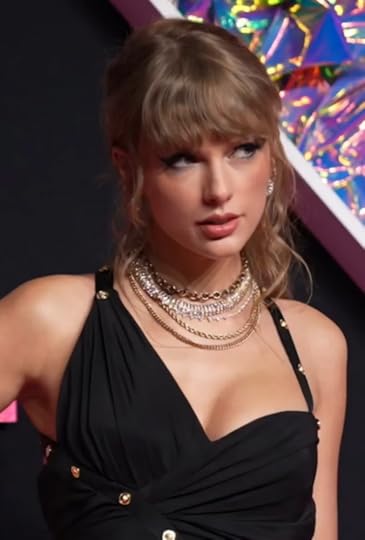
Photo by iHeartRadioCA, CC BY 3.0, https://commons.wikimedia.org/w/index.php?curid=137551448
Travis Kelce and the Super Bowl aside, Taylor Swift, currently the most popular musician on the planet, has been making headlines in the high concert ticket pricing debate for some time now. One has to look no further than the superstar’s recent Eras Tour, which grossed approximately $1.04 billion, making it the best-selling tour in history, according to Pollstar, a music industry publication that reports on the touring industry. One does not make this type of money by selling $20 tickets. What makes this figure even more impressive is the fact that she accomplished this by playing just 60 dates, selling more than 4.3 million tickets, making the average ticket price about $238.95. A far cry from the average general concert ticket price of $94.78 per ticket in 2018. What happened?
A lot!
Nothing stays the same. As time moves on, prices for just about everything in life must change, as is evident from the most recent Taylor Swift example. There are many reasons for this and I could probably write an article for each. For now though, here’s a short list of the main changes as I see them.
Major overhaul in the music industry as a whole, mainly because digital music and streaming have replaced physical sales drastically reducing the amount of money artists can make selling music.
Normal economic inflation and rising costs in the logistics industry, global fuel prices, etc.
Effects of the COVID-19 pandemic.
Additional ticket fees and dynamic pricing models. A 2018 report by the Government Accountability Office states that fees on initial ticket sales added 27% on average to the cost of the ticket.
An ever-growing and evolving secondary ticket market.
Record labels taking larger percentages of artists’ touring profits and artists raising ticket prices (meet & greets, premium plans, and so on) to make up for the new structure.
Not all artists have gone down without a fight, however. Long before the Swifties got all riled up about their idol’s ticket prices, American rock legends, Pearl Jam, led a fight against Ticketmaster at the height of their power in the mid-90s.
On June 30, 1994, Stone Gossard and Jeff Ament, two of the founding members of the band testified in court about their concerns over the ticketing company’s monopolistic behavior.
“…we brought to the Government’s attention certain conduct by Ticketmaster that we believe is unlawfully interfering with our freedom to determine the price and other terms on which tickets to our concerts will be sold. The high price of concert tickets — especially the imposition of excessive service charges — is a significant issue to us and we believe to the public generally. In this statement we will discuss the reasons why Pearl Jam is especially sensitive to the price of tickets to our concerts; describe some of the incidents that led us to bring Ticketmaster’s conduct to the attention of the Justice Department; address the reasons why we believe Ticketmaster’s business practices violate the antitrust laws and the consequences those business practices have on us, on our fans, and on others who purchase tickets to concerts; and finally discuss the type of change we hope will occur in this industry and how Government action might help bring that about.”
— excerpt from Pearl Jam’s testimony before Congress June 30, 1994
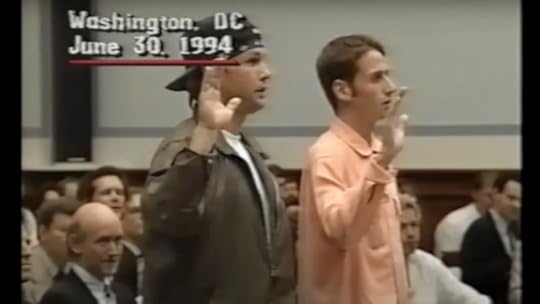
Photo credit Pearljam Online/Youtube
It’s unfair to compare what happened in 1994 with what’s happening in 2024, not only because three decades have passed, but changes in technology, governments, global health issues, and the music industry have turned things upside down and sideways many times over. What is fair to mention, though, is Ticketmaster and the music ticketing world are still (for the most part) in control of and making a mess out of live music.
“…many of Pearl Jam’s most loyal fans are teenagers who do not have the money to pay the $50 or more that is often charged today for tickets to a popular concert. Although, given our popularity, we could undoubtedly continue to sell-out our concerts with ticket prices at that premium level, we have made a conscious decision that we do not want to put the price of our concerts out of the reach of many of our fans. Moreover, we do not want to be responsible for teenagers, who may be influenced by peer pressure to feel that they must see Pearl Jam perform, spending more money for that concert ticket than they can really afford. All of the members of Pearl Jam remember what it is like not to have a lot of money, and we recognize that a teenager’s perceived need to see his or her favorite band in concert can often be overwhelming.
For these reasons, we have attempted to keep the ticket prices to our concerts to a maximum of $18. We have also tried to limit any service charges that may be imposed on the sale of those tickets to 10 percent of the ticket price and to ensure that any service charge will be separately identified from the price of the ticket itself so that fans know how much is being charged for the ticket and how much is being added on by the company selling the ticket. As a result, even where a service charge is imposed, our goal is to make it so that no one will pay more than $20 to see a Pearl Jam concert.
— excerpt from Pearl Jam’s testimony before Congress/June 30, 1994
Pearl Jam lost its infamous battle against Ticketmaster as the government ruled the ticketing giant was not a monopoly. Still, I’d argue the band raised enough awareness that Ticketmaster lost the fight in the court of public opinion. A small victory in an overall loss, but at least the band’s message was heard loud and clear.
Since then, there hasn’t been much of a backlash against Ticketmaster from popular artists until the recent Taylor Swift tour, as tickets on the secondary market were listed as high as $11,000 per seat! This was after the face-value seats ranging from $49 to $449 disappeared quicker than it took you to read this sentence.
This fiasco brought the debate back full circle, and suddenly, it was 1994 all over again. In an interesting twist of timing, Pearl Jam has recently announced dates for its upcoming world tour via the band’s website and fan club (in conjunction with Ticketmaster because there’s no choice) with tickets costing $185 each. Even though they try as hard as they can to keep their ticket prices as low as possible and utilize a lottery system through the Ten Club (their longstanding fan club), many of their fans have been shut out (myself included) of the opportunity to purchase tickets to this tour thus far. They do have a fan-to-fan ticket exchange that will also run through Ticketmaster at a later date, so I’m confident I’ll get to go to a show or two, but trying to see live music these days feels more like a part-time job than a fun and exciting experience.
I wanted to write this article because I’ve been witnessing the speedy descent from how things used to be within the music industry to the current way things are, with very little room in between to figure it all out. It’s the new Wild West, but instead of saloons and six-shooters, there are streaming services and AI bots. We’re all still navigating the landscape.
We need a music industry — which includes fans, by the way — that values the work and contributions of artists so much more than it does now. If we continue to devalue what they do, there will come a time when it’s no longer feasible for them to make music. This is likely what the AI companies and record labels want so they can one day share in all of the profits with each other because the human element will be phased out. That sounds like something from an old Sci-fi film, but if you’re paying attention, is it that difficult to envision? I don’t believe it is.
If you’d like to follow more of my work, please follow me on IG, LinkedIn, and Facebook.
Reserve your signed copy of my forthcoming book, SLACKER — 1991, Teen Spirit Angst, and the Generation It Created (Inspired By You Books 2024) here.
This article first appeared in The Riff Magazine on Medium.
February 13, 2024
Nearly 12,000 Days After Its 1st Single, Pearl Jam Sounds As Strong As Ever On Its Latest Release, "Dark Matter"
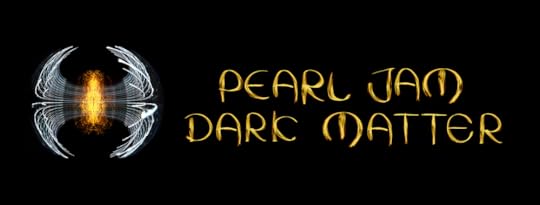
(Photo Credit - Pearl Jam Facebook Cover)
I will go out on a limb and say most musicians would bet against the idea of being around long enough to release music 32 & 1/2 years after their first song hit the airwaves. In the case of Pearl Jam, a staple of American music and member of the Rock & Roll Hall of Fame, not only have they lasted over three decades, but their latest single, "Dark Matter" (title track off the band's 12th studio album due out on 4/19/24 via Monkeywrench/Republic Records) has the energy and feel of its earliest material which is a bit of a departure from some more recent releases.
Beginning with a rolling Matt Cameron drum beat, followed by a heavy and infectious guitar riff, "Dark Matter" immediately tells the listener they're in for a raucous ride. For the sake of full transparency, I've been a Pearl Jam fan since the start, nearly 12,000 days ago, but haven't always been excited after hearing a new single. Sometimes it takes a while for a song to hit me and although it's rare in the case of Pearl Jam, sometimes I wound up not liking a song at all. I'm a fan but I'm objective. "Dark Matter" however, hit me hard from the first listen, and to my ears, it has everything a great Pearl Jam rocker should have. Consider me excited!
We all hear and feel music differently and the beauty of all art, music included, is that how we interpret it is subjective. I'm not going to break the song down part by part (other than the brief description I gave above) because what I hear won't necessarily be what you hear. I'd love to know what you think of it though so feel free to respond to this piece.
What I find so interesting about this track is that with so many years and miles behind the band, millions of fans around the globe have been anxiously awaiting its release. When Pearl Jam released its debut album Ten in 1991, the world didn't live under the constant ordinance of technology we do today. There was no way to know who wanted it, or more accurately, (other than Green River and Mother Love Bone fans), even knew it was coming out. In the pre-internet age, information moved at a snail's pace. In our current cultural environment, however, countless numbers of eager souls and ears were chomping at the bit for the band's latest effort.
I wrote a book called SLACKER - 1991, Teen Spirit Angst, and the Generation It Created (due 2024 via Inspired By You Books) in which the theme is how the early grunge and alternative music phenomenon of the early 80s (mainly in the underground) through the early 90s (the global explosion) had grabbed a hold of an entire generation and helped shape those kids into the adults they became over 30 years later. The anticipation and utter excitement I've seen around the world as folks were pining for this release is the proof of concept I discuss in the book.
Pearl Jam worked with producer Andrew Watt on their soon-to-be-released album and so far the results sound terrific. I think the choice to go with the 33-year-old native New Yorker was a smart decision for several reasons. Watt, originally from Long Island, NY, was only a year old when Ten was released. Too young to have followed the beginning of the band or the movement initiated out of Seattle, Watt grew up a Pearl Jam fan and was certainly inspired by them as he chose a path of playing, writing, recording, and producing music. In my opinion, sometimes getting the perspective of a fan whose life was partially shaped by the music an artist makes can lend some keen insight and help guide the band in ways others couldn't.
In addition, Watt has earned his stripes leading up to producing Dark Matter as he's worked with the likes of Post Malone, Lana Del Rey, Ozzy Osbourne, Miley Cyrus, Iggy Pop, Elton John, Stevie Wonder, The Rolling Stones, and on Eddie Vedder's solo album Earthling. He was also named Consequence Magazine's "Producer of the Year" in 2022 and even brought home the "Producer of the Year" Grammy Award in 2021.
Music means so many things to so many people. It's not up to me as a writer to tell anyone what to think but I can share my opinion and I hope you will share yours as well when you hear Pearl Jam's latest single, "Dark Matter". The track is here if you'd like to check it out.
I've followed this band (and the bands the members were spawned from) since the late 80s and I've been inspired so much by them and the musical movement they helped create to become a music writer, cover live shows, including Lollapalooza in 2007, and now pen my first book. Whether it's Pearl Jam or another band or artist, I hope you have been lucky enough to have let music inspire you to do what you love, trust me, it's worth it! Life is short and we must do what we know we're meant to do...
"You're running away,
We're pulling apart,
In all of this, dark matter"
- Pearl Jam/"Dark Matter"
If you'd like to read more of my work, please bookmark this blog or follow me on Medium, Instagram, X, Facebook, or LinkedIn.
For a signed copy of my forthcoming book, SLACKER - 1991, Teen Spirit Angst, and the Generation It Created, reserve your copy here.
December 1, 2023
Distorted Guitars, Flannel Shirts, and Teen Angst - The Marketing of "Grunge"
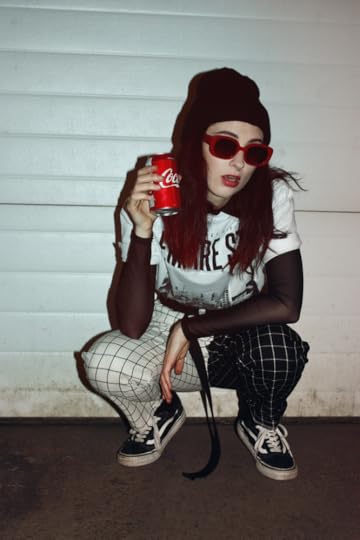
They say music brings people together. I've personally witnessed how true that statement is thousands of times over. There's a kinship that's built with perfect strangers the minute it's discovered those strangers like and appreciate the same music. Once they realize how deeply a certain genre or artist affects them, those one-time strangers are now friends for life. Music does that to people.
I say all of that because this piece is a product of that description. In a conversation with Michele Mangiapane Gardner, the woman behind "The Grunge Legends" Facebook Group (over 35K members strong), it came up that a story about the term "grunge" might be an interesting idea. I hope you agree with us!
I don't necessarily like being the bearer of bad news, but I have a feeling I may be exactly that to some of you once you read the next sentence. Grunge is not a sound. I hope you're still with me.
In short, the term "grunge" was co-opted by advertising agencies, record labels, and the media in the early 1990s to sell and promote music coming out of Seattle, Washington. It's very difficult to sell something, music or otherwise, without a name and image associated with it. That's it. It's as simple as that.
Guess what though, you shouldn't care!
The terms, Classical, Country, Jazz, Blues, Rock, Motown, Disco, Punk, Heavy Metal, Hardcore, Pop, Alternative, and yes Grunge, all exist to identify sounds (and images) of certain styles of music so they can be easily discussed, categorized, and of course, sold. Each one of those labels conjures up ideas of what the music sounds like, the artists most associated with them, and the images they've established. None of that happens by accident. It happens because all of that music has been carefully marketed and packaged so we can buy it. We've been told what to call it, so we do. There are many subgenres each one of those types of music has spawned, and for the most part, in my opinion, the sound of the music belonging to each label (and subgenre) is easily identifiable. Except, that is, for grunge.
I'm willing to bet that depending on your age, level of interest in the grunge movement, and even where you're from, all play varying roles in how you feel about what you just read. For transparency's sake, I'm 50 years old (was 18 and a freshman in college in 1991), began consuming the music that would eventually be labeled alternative and grunge around 1987, and haven't stopped yet. I was born and raised in Brooklyn, NY, and have lived in the New York City metro area my entire life.
Those facts skew my perception towards what was written in earlier paragraphs one way, just as your age, interest in the music, and geography likely skew yours.
If there's a "Big 4" of grunge, I think it's been universally established that Nirvana, Pearl Jam, Soundgarden, and Alice In Chains, are in fact, the "Big 4". If you agree with this, you then have to agree that grunge is not a sound. If you have heard more than a handful of songs from each of those bands you know that the music each has written, recorded, and released, does not sound like the others. Before a few of you blow a gasket, some of the songs do have similarities. Let's be honest, it's rock music with guitars, bass, drums, and vocals so yeah, some of it will sound alike. Let's think about each band separately though. Nirvana, for the most part, is melodic punk rock with a Beatles-ish pop sensibility baked in. Pearl Jam is heavily influenced by 70s hard rock with punk leanings and folk and singer/songwriter-esque parts thrown in for good measure. Soundgarden mixed heavy metal with psychedelic rock, odd time signatures, and beautifully sung vocals to throat-exploding screams from one minute to the next. Lastly, Alice In Chains, used mood, atmosphere, and vocal harmonies in their version of heavy metal and hard rock. If the term "grunge" was meant to sound like anything, it would sound like AIC much more than it would the other bands mentioned.
It gets even trickier.
Screaming Trees, Smashing Pumpkins, Stone Temple Pilots, Radiohead, Blind Melon, and Foo Fighters have all, multiple times over, been called "grunge". Even the bands that started most of this music, Green River, Melvins, Skin Yard, Jane's Addiction, Dinosaur Jr., Pixies, and so on, do not all sound alike. There's a quote attributed to Sub Pop (the indie record label from Seattle that first signed many of these bands including Nirvana) co-founder, Bruce Pavitt while describing the music of the EP Dry as a Bone by Green River in 1987 as "gritty vocals, roaring Marshall amps, ultra-loose grunge that destroyed the morals of a generation".
Mark Arm of the aforementioned Green River used the term even earlier. In 1981, he wrote a letter under his given name Mark McLaughlin to the Seattle zine, Desperate Times, criticizing his band Mr. Epp and the Calculations as "Pure grunge! Pure noise! Pure shit!".
Wherever the term "Grunge" came from, its meaning was meant to describe noisy guitar music with a very low bottom and groove-laden bass sound, which may or may not have been meant to be all that appealing to listen to. It was very specific to a few bands. It was never meant to be anything else.
If you were around in the early 90s, you heard the term "grunge" incessantly and you also heard how the musicians associated with the music hated it. Trust me, folks, culture changed when Nirvana took off and all the bands that were out before them were suddenly thrown into a global spotlight that burned hotter than the sun. Most of these artists never once imagined that their loud, "grungy" music would be heard outside the city of Seattle, let alone all over the world. It was a scene in the truest sense of the word. The planet wanted to know everything that grunge and Seattle had to offer and for a potential sale that big, the scene needed a name. Ladies and Gentlemen, let me introduce to you...Grunge.
The media and marketing blitz that followed was something the world hadn't seen since Beatlemania. Just like the British Invasion, it started with one band (Nirvana) but led to a society-shifting bevy of bands that would go on to rule the music industry for nearly a decade. Things got so out of hand at one point, the vaunted New York Times would reach out to the tastemakers themselves, Sub Pop Records, and report what they had learned. And boy was that a mistake.
In late 1992, a reporter named Rick Marin, while working on a story about the global "mainstreaming" of grunge for the Styles section of the NY Times, was put in touch with a woman named Megan Jasper. Jasper, at the time, was a 25-year-old Sales Rep at Caroline Records who was put in touch with Marin by Sub Pop's other co-founder, Jonathan Poneman, because Poneman was tired of dealing with press like this and thought Jasper would have some fun with it. What ensued became legendary.
Marin had mentioned to Jasper that he wanted to put together, along with his story, a "Grunge Lexicon", because you know...this weird music and these crazy kids must have their own language, right? Right??
Jasper, knowing "grunge" didn't mean anything in Seattle and was just a label used to mark and identify what the advertising agencies and record companies were selling, humorously obliged to Marin's request.
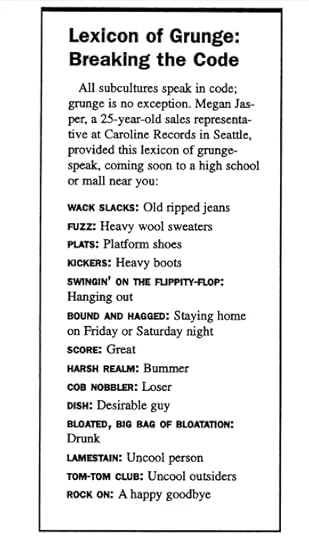
The simple fact that anyone could take Jasper's phrases and definitions seriously, and go so far as to print them in the NY Times of all places, shows you how thirsty people were to jump on this bandwagon and profit from it. Grunge may have been used to describe a very specific sound made by a small handful of bands in the 80s, but it was never intended to become a genre. If you want to be extremely literal, based on the people who first used the term in Seattle, there may only be about four or five "grunge" bands in the world. It's not a genre of music, nor is it a sound meant to describe thousands of bands, it's a marketing term, with mass and emotional appeal, to sell a style and a scene to hundreds of millions of people. And it worked.
And you still shouldn't care! If you love the music from the early and mid-90s, regardless of what people call it, then love it. If you want to refer to it as "grunge", that's fine too. It helps with identifying the time period you're speaking about and most of the bands from said period. I wrote a book called SLACKER - 1991, Teen Spirit Angst, and the Generation It Created (due out 2024) and the term "grunge" was used frequently. It's fine to use but it should also be understood where it came from and why it's used. It's one of the only genres of music that I can think of, and probably the biggest, that has this unique naming discrepancy. For music geeks like us, it makes for great conversation, for the rest of the world, I doubt anyone cares.
Oh, and I'm not sure what happened to the NY Times reporter, but Megan Jasper is the long-time CEO of Sub Pop Records. This is not a trick this writer is playing on you the reader, this is completely true.
If you'd like to reserve a signed, 1st Edition copy of SLACKER, you can do so here.
For updates on appearances regarding the book, information about its release, and this wonderful music scene we all love, follow me at Instagram Facebook LinkedIn TikTok X (Twitter)
November 29, 2023
I Wrote a Book About Music That Came Out More Than 30 Years Ago...Should Anyone Care?
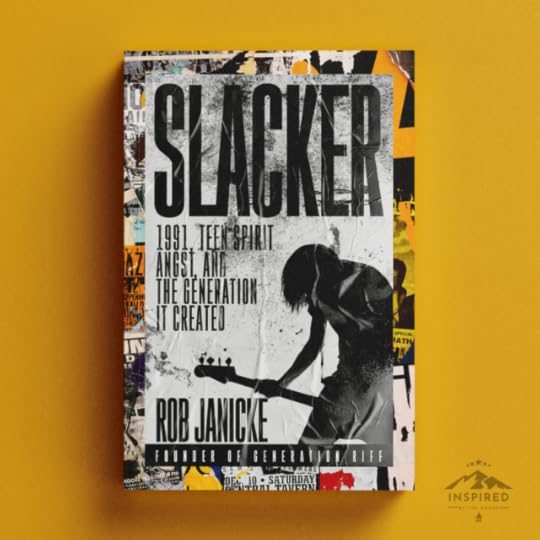
You conjure up an idea, scribble down some notes on a piece of paper, make voice memos on your phone, and voila, about three and a half years later you have a book. See how simple it is?
I came of age in the microwave generation and I've lived long enough to exist in a world ruled by Amazon. To say we're a generation (and now a race) of people who define instant gratification as yesterday, would be a massive understatement. Knowing this, why the hell would I embark on a journey that would likely take almost four years before seeing a finished product?
Waiting for anything simply isn't something we do anymore. When my daughter puts a snack into the microwave and lets out an audible and disconcerting sigh because she must wait another 14 seconds for her taste buds to become happy; or when my son finds out that the package from Amazon won't arrive until 10 AM even though he ordered it at 8 PM the night before (could you imagine the nerve?) grunts out a "this is ridculous", how can I expect to be satisfied that my book, SLACKER - 1991, Teen Spirit Angst, and the Generation It Created, won't see the light of day until nearly four years after I wrote its first word?
The answer, for me at least, is simple. In reality, this book took over 35 years to write, so three years and some change is nothing.
The music that took over the world in the early 90s, was due in large part to the first single and video released by a band with almost no following to speak of outside of Seattle, Washington. Nirvana's second album, and first major label release, Nevermind, exploded into the musical and cultural consciousness, not long after first coming out in the early Fall, of 1991. Once this happened, 18-year-old me, along with tens of millions of people around my age across the globe, found a new sonic home. Whether it was called grunge, alternative, hard rock, punk, etc, really didn't matter. It did matter to 5th Avenue and the record companies that would rake in billions of dollars on the sound and fashion they helped to manufacture for decades to come, but to the kids listening to the music, we felt heard.
I've been listening to what some would call alternative music since 1987 with my introduction to Jane's Addiction. Ironically, the band's debut, self-titled album was released on my birthday, May 15, in 1987. I guess the universe knows what it's doing because this is certainly a strange coincidence. The album was a live recording, which is extremely rare to be used as a band's debut, but as we'd come to learn about Jane's, they were anything but conventional. Regardless, this record helped move me along the musical path I was already on with hard rock, heavy metal, and rap. It was the next logical step in my evolution of sound and what would appeal to me going forward. When the planet as a whole heard it all in 1991 and 1992, everything changed.
So with roughly 36 years of listening to this music and all the variations and sub-genres it produced, I felt the time was right to put pen to paper, voice to phone, and ultimately, fingers to keyboard, and tell the story of how I took in one of the biggest and most influential music scenes of all time. You don't have to be a fan of the scene or the music it produced to understand its significance. As a matter of fact, that's typically a strong sign of something big crossing over into territories it otherwise could not have. When people who are indifferent to, or downright dislike, a certain style of music but can see and appreciate its relevance and historical impact on society, you know you're dealing with something special.
A book like SLACKER couldn't have been written by someone who wasn't there for the entire scene. It wouldn't do the music and the emotional impact it had any justice. Sure, someone could have researched facts, figures, record sales, and timelines, but I don't believe that alone would provide the value of someone who felt it and lived through it all. That's one of the reasons I chose to write it. I may not have been in a band, nor did I live in Seattle, but with every fiber of my being for the better part of 10 years, I felt like a fly on the wall in every recording studio and all of the tour busses that housed the bands that created the music. Most of this happened in the pre-internet days, and all of it happened before social media, so I devoured every magazine, book, and newspaper article I found on the subject. I read every interview and watched every documentary. I watched 120 Minutes, Alternative Nation, and YO! MTV Raps, religiously. I went to hundreds of shows, seeing both local and national touring bands, and I talked about the music and the scene with like-minded people incessantly. In my twisted mind, I knew this knowledge and love for the scene would turn into a book someday. I didn't know how, and frankly, I'm still amazed I did it, but hey, I wrote a book about all of it.
Should anyone care that I wrote a book about music that was released over 30 years ago? Yes and no. No one should care that I, Rob Janicke, wrote a book. That being said, I think millions of people who love this music and the scene it created as much as I do, should care that a book was written about it. I didn't want it to be just another book on bands and music. Not that there's anything wrong with that (I say in my best Jerry Seinfeld and George Costanza voices. If you know, you know), but as a matter of fact, without books about bands and music I wouldn't have had the desire, drive, or courage to write this one. My point is, I wanted SLACKER to encompass not just the music, but what the music did to an entire generation with regard to the emotions and life-changing affirmations of millions of fans around the world. I find the emotional and biological attachment we have towards certain music fascinating. To that end, I interviewed therapists, sociologists, and scientists to help explain it all.
SLACKER - 1991, Teen Spirit Agnst, and the Generation It Created is something I'm incredibly proud of. My hope for all those who read it is that they're brought back to a time in their lives that meant a lot to them so they can relive some great memories from their childhood. Similarly, I hope that they can truly feel, and thus understand through my journey listening to the music of the 90s, how and why so many people were affected by the most unlikely commercial success that was grunge and alternative music. I'd also love it if it sparks conversation and creates the inspiration to dive back into the bands and songs with new and older ears, or if they're new to this music, listen for the first time and hopefully add the genre to your current music listening rotation. Either way, thank you all for joining me on this wild ride!
If you'd like a signed, Limited 1st Print Run Edition of the book, click this link.
Follow me on social media at:
April 28, 2023
90 For The 90s
The blog series created by Rob Janicke discussing a bunch of albums from the 1990s for you to argue with him about
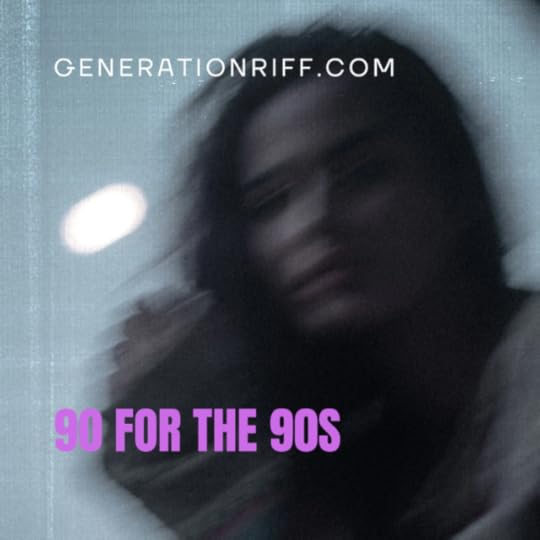
Album #3
Public Enemy - Fear of a Black Planet (released on April 10, 1990, via Def Jam and Columbia Records. Produced by The Bomb Squad)
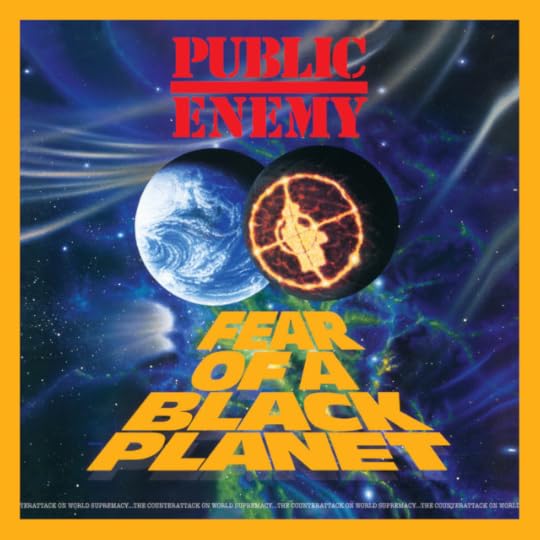
Before diving into the third record on my 90 for the 90s list, let's get something out of the way right now. I've held Public Enemy in as high regard, musically and culturally, as anyone can. I heard them for the first time in 1987 with their debut, Yo! Bum Rush the Show and was floored straight away. By the time their next record came out, 1988's It Takes a Nation of Millions to Hold Us Back, quite possibly the greatest hip-hop album ever made, PE had taken this new genre and claimed it as their own.
That quick intro is my way of saying that what comes next may have a bit of bias woven into the fabric.
I'll start by showing I can be objective when it comes to Public Enemy. The album that is the focus of this edition of 90 for the 90s, Fear of a Black Planet, is not as good as the band's previous effort, the mighty It Takes a Nation of Millions to Hold Us Back.
That being said, Fear of a Black Planet, was and is, a landmark rap album, both sonically and conceptually. In case you weren't alive or just not paying attention, this record was made during the wild west-like days when sampling did not come with legal ramifications. Much like the Beastie Boys sophomore album, Paul's Boutique, released less than a year before Fear of a Black Planet, the record is layered with sounds, beats, and grooves both familiar and brand new, creating a collage of sound, unlike anything that came before it.
Ushering in the '90s with themes of multiculturalism and blurred lines of a society in flux, Fear of a Black Planet is also one of the Bomb Squad's (the production team consisting of Hank and Keith Shocklee, Chuck D, Eric "Vietnam" Sadler, Gary G-Wiz, and Bill Stephney) finest musical moments. One of the smartest moves they made, as tempting as it must've been, was to purposely not make It Takes a Nation of Millions to Hold Us Back 2.0.
Chuck D, known for his hard-hitting, militant, vocal style was at his MCing best on ...Nation. On Fear of a Black Planet, The Bomb Squad diversified the sound, as well as Chuck's approach on the mic. Seductive grooves, ferocious beats, hard funk, and dub reggae all get mixed in with the infamous bombast of Chuck's classic flow.
Correctly considered to be one of the greatest lyricists of his time, Chuck took on a plethora of topics on PE's third studio album. Everything from empowerment within the black community, white supremacy, institutional racism, social issues facing African Americans, the power elite, and race relations in the United States at the time, Chuck pulled no punches but landed plenty. Chuck's words were angry, persuasive, and elegant. He was expressing what was wrong, both due to happenstance and willful destruction by the powers that be.
Fear of a Black Planet was controversial, brutal, necessary, funky, and as in-your-face as an album could be. It's vintage Public Enemy that more than stands the test of time, 33 years after its release. Its impact, as well as PE as a group, is too large to measure. And not just in the hip-hop world either. The influence there is a given.
The late 80s/early 90s was a massively transformative time in popular music and culture. Fear of a Black Planet would and still does, influence artists from all genres, including rock, metal, punk, and alternative.
Talking to Billboard Magazine for a 30-year retrospective on Fear of a Black Planet, the multi-talented musician, Ben Harper, had this to say:
"We are talking about a time when music still represented the reflection of the pulse of a time, of a people, of an era — and we needed it. We needed it, and it was one thing to be cutting-edge hip-hop, but it was another thing to be cutting-edge hip-hop that didn’t flinch in the face of authority, and to actually say, “Oh, you thought you were the authority? The joke’s on you because we are.” And you can dissect it word for word, syllable for syllable, and you just get that much more out of it.
To this day, they are one of the most important groups in my experience. And it reminds me … the vehicle that music can be for social consciousness and awareness and socio-political proactivity in one’s life. They’re just a permanent reminder that you can’t sit still. The music of Public Enemy has meant as much or more to me than any music I’ve ever heard."
In the same article, Kevin Shields of My Bloody Valentine said:
"To me, it’s a bit like Revolver and Sgt. Pepper’s. A lot of people go, “Revolver’s the best one,” but in a way, like Fear of a Black Planet, the tempos are more intense on Sgt. Pepper’s, it feels like now. Fear of a Black Planet actually suits the mood we’re in now — the tension dial’s been turned up three notches higher. It’s all continuous — it’s a continuous record — and I think as a production, it was a statement — a kind of an attitude statement. I think with Fear, they did actually manage to surpass what they did before, even though it was the record before that turned everyone on to them....it was really f–king influential. And it didn’t get old. That record doesn’t sound old at all. It’s timeless."
Sometimes it feels as though Public Enemy doesn't get talked about enough when it comes to the history of modern music and that's a shame. Regardless of era or genre, Public Enemy, with Fear of a Black Planet as evidence, is one of the most important bands of all time, and should be characterized as such. With tracks from Fear of a Black Planet such as "Welcome To The Terrordome", "911 Is A Joke", Fear Of A Black Planet", and "Fight The Power" try and convince me otherwise.
I'm currently writing my first book which will include discussions on many of the bands and artists discussed in this blog series. If you'd like to reserve your signed, limited 1st print run edition of SLACKER - 1991, Teen Spirit Angst, and the Generation It Created (Inspired By You Books 2023), click here.
For updates on my writing, including this series, 90 For The 90s, as well as all things SLACKER, please follow me on social media:
Generation Riff



